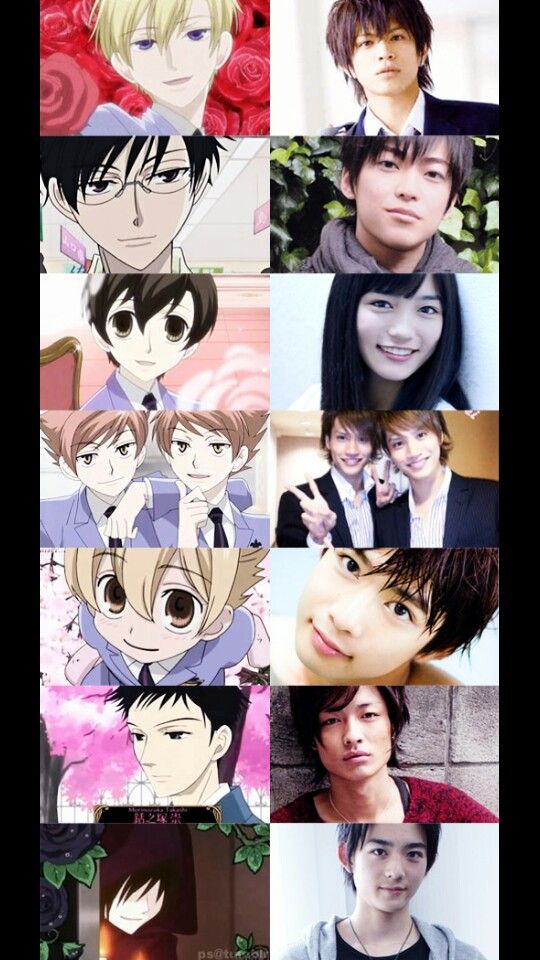Isn’t it funny how when something is a hit, we’ve got remake it over and over and over and over and…
You get the point. But we don’t just remake it in the same form. We make a movie form and a book form and a television form and a video game form, and then we twist it and tell the same story again, with new twists or new settings or with some characters now a different gender or whatever fits our fancy.
(I actually took a lovely online class a few years back about how stories change to fit different mediums, which we explored by comparing the same “scenes” in the Lord of the Rings, through the movies, books, and LOTR online. Also we read a lot of romantic (time period, not romance-based) poetry and stories which form the basis of modern fiction.)
I recently noticed that the Japanese do this too–though they do it differently. The stories never seem to make it to the twisting phase. Let’s take one of my favorite anime series, Ouran High School Host Club, which is utterly ridiculous at almost all times, yet still manages to make you care about all the characters.
Ouran High School Host Club (here on out shortened to Ouran) started as a manga (for those unfamiliar with the term, manga is kind of like a comic book, so pictures and words in a sequential order) and the beginning of the manga was made into an anime (essentially a cartoon). Many anime are made from manga series, and, for the most part, anime series tend to follow their manga counterparts pretty closely.
(Manga series can be quite long–over 500 chapters–so you occasionally run into problems when the manga and the anime are running concurrently and the anime catches up to the manga. Anime sometimes goes through “filler arcs” which tell a story outside of the manga’s storyline but for the most part sticks to the same world and doesn’t alter anything major. Some of these are more successful than others. Or the anime may strike out on its own.)
Some years after the anime came out, they made a live action series of Ouran. Like it sounds, live action series have real people in real locations.
(If you’d like to see a character comparison, well:

What’s interesting is that the story doesn’t really change between mediums–when watching the live action, I recognized almost all the episodes from the anime–and when additions are made (such as a filler arc or a movie) they’re always made to fit into the world and story lines that already exist. If an anime gets too far from the manga, they remake the anime to fit the manga better.
But, as far as I know–and please feel free to correct me if I am wrong–they never twist. From Peter Pan they wouldn’t get Hook, or Jake and the Neverland Pirates, or Peter and the Starcatcher. No Wizard of Oz except they’re all insane, or everyone’s a grown up and steampunk, or told from the witch’s point of view.
You have Bleach, and Bleach goes on for 696 manga chapters, 366 anime episodes, four movies, a live action film (which JUST came out), five musicals, two trading card games, several light novels (essentially a novel with occasional manga-style pictures), and at least five video games. Or One Piece, which has been going since 1997 and has over 800 anime episodes. A story can go on forever, being retold from one medium to the next, and then, when they’re done…they’re done. On to the next thing. Or the same thing in a different form.
(Not to say that everything does this, of course. Trigun, for example, is quite manageable at 97 manga chapters and 26 anime episodes–though it is a case where the anime took liberties. Cowboy Bebop–which started as an anime and then became a manga–also has 26. And these are ~25 minute episodes in many cases.)
I just think it’s interesting, to look at how a story can mean so much that we’re willing to watch it–or read it, or play it–over and over. And to see how different cultures go about doing just that.
Am I wrong about Japanese storytelling not twisting the same story into new forms? (I know there are some manga/anime that are twists on Western stories–Pandora Hearts, which I’m reading right now, obviously has its roots in Alice in Wonderland–but I’m unfamiliar with any stories that are twists on other Japanese stories.) Favorite version of a favorite story?



